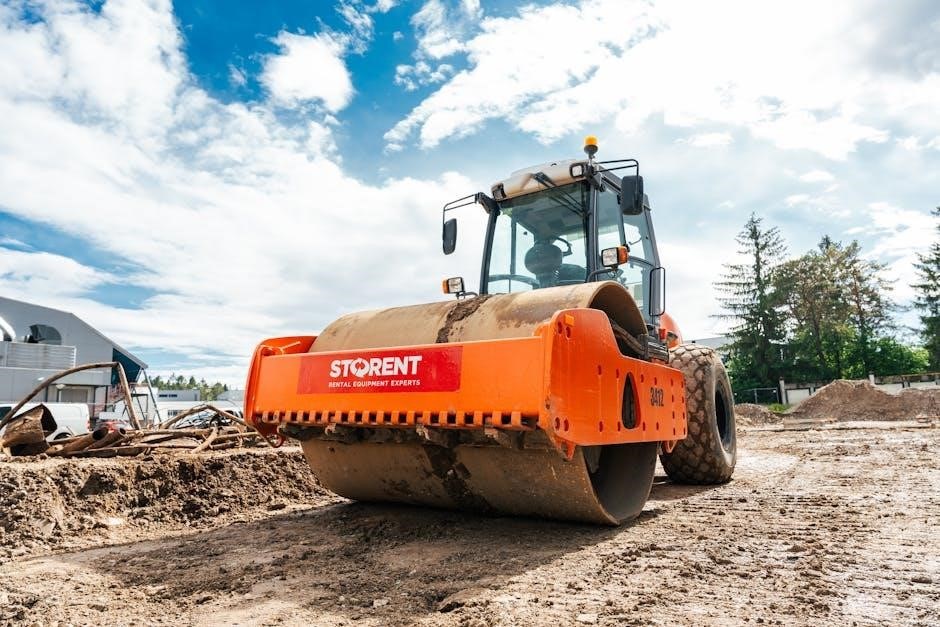A commercial rental application is essential for landlords to evaluate potential tenants, ensuring a smooth rental process and legal compliance while protecting both parties’ interests․
What is a Commercial Rental Application?

A commercial rental application is a formal document used by landlords or property managers to assess potential tenants for a commercial property․ It typically includes detailed information about the applicant, such as business history, financial stability, and intended use of the space․ The application also gathers personal and professional references, ensuring the landlord can evaluate the tenant’s credibility and ability to meet lease obligations․ Unlike residential applications, commercial ones focus on the business entity rather than individual renters․ This document is crucial for landlords to make informed decisions and protect their interests while ensuring compliance with legal requirements․ It serves as the foundation for tenant screening and lease negotiations․
Why is a Commercial Rental Application Necessary?
A commercial rental application is necessary to ensure landlords or property managers can thoroughly assess potential tenants․ It provides critical information about the applicant’s business history, financial stability, and proposed use of the property․ This helps evaluate the tenant’s credibility and ability to meet lease obligations․ The application also serves as a legal document, protecting both parties by outlining terms and expectations․ Additionally, it streamlines the tenant screening process, reducing risks associated with non-payment or property damage․ By requiring detailed documentation, landlords can make informed decisions, ensuring a mutually beneficial rental agreement․ This process ultimately safeguards the landlord’s investment and maintains a professional rental relationship․

Key Components of a Commercial Rental Application
A commercial rental application typically includes applicant information, business details, financial records, proposed use of premises, and required documentation to help landlords evaluate tenant suitability and compliance․
Applicant Information
Applicant information is a critical component of a commercial rental application, requiring details such as the applicant’s name, date of birth, contact information, and Social Security number․ For business entities, the legal name, federal tax ID, and authorized representatives must be provided․ Previous addresses, both personal and business-related, are often requested to assess rental history and stability․ This section may also include co-applicants or guarantors, ensuring all parties are accountable․ Accurate and complete applicant information helps landlords evaluate credibility and suitability for the commercial space․ Missing or inaccurate details can delay processing or result in rejection․ Proper documentation, such as identification and proof of business legitimacy, may be required to support the application․ This ensures transparency and accountability for both parties involved in the rental agreement․
Business Details and History
Business details and history are crucial for assessing a tenant’s credibility and operational stability․ Applicants must provide information about their business structure, such as sole proprietorship, partnership, or corporation․ The application typically requires the business name, registration details, and federal tax ID․ A brief history of the business, including years in operation and industry experience, is often requested․ For newer businesses, proof of concept or a business plan may be necessary․ Previous tenancies and references from past landlords are also commonly included to evaluate rental reliability․ This section helps landlords understand the applicant’s business background, ensuring alignment with the property’s intended use and long-term viability․ Accurate business details foster trust and informed decision-making for both parties․
Financial Information and Requirements
Financial information is a critical component of a commercial rental application, ensuring the tenant can meet rental obligations․ Applicants are typically required to provide recent bank statements, tax returns, and profit-and-loss statements․ This data helps landlords assess the business’s financial health and stability․ Additionally, some applications may request a credit check or proof of assets․ Rent-to-income ratios are often evaluated to determine if the business can sustain the rental payments․ In some cases, a security deposit or guarantee may be requested to mitigate risks․ Providing accurate and comprehensive financial details is essential for a successful application and building trust with the landlord․ This section ensures both parties enter an agreement with financial transparency and mutual confidence․
Proposed Use of the Premises
The proposed use of the premises is a vital section in a commercial rental application, detailing how the tenant intends to utilize the space․ This information helps landlords ensure the business activity aligns with local zoning laws and property regulations․ Applicants are typically required to describe the nature of their business, the type of operations, and any specific requirements for the space, such as equipment or storage needs․ This section also clarifies whether the premises will be used for retail, manufacturing, office work, or other purposes․ Accurate disclosure is essential to avoid future disputes and ensure compliance with legal and safety standards․ Landlords use this information to assess suitability and potential risks associated with the intended use․ Clear and detailed responses are crucial for a smooth approval process․ Proper utilization ensures the property remains compliant and safe for all parties involved․

The Process of Completing a Commercial Rental Application
The process involves obtaining the application form, completing it with accurate details, attaching required documents, and submitting it for landlord review and approval․
Steps to Fill Out the Application Form
To complete a commercial rental application, start by carefully reviewing the form and ensuring all sections are filled out accurately․ Begin with applicant information, including business name, legal structure, and contact details․ Next, provide a detailed business history, such as the nature of operations, years in business, and previous rental experiences․ Financial information is critical; include income statements, balance sheets, and bank references․ Clearly state the proposed use of the premises and any specific requirements․ Attach all required documentation, such as identification, business licenses, and financial records․ Finally, review the application for completeness and accuracy before submission․
Required Documentation

When submitting a commercial rental application, several key documents are typically required to ensure a thorough evaluation․ These include proof of business identity, such as a valid business license or incorporation certificate․ Financial documentation, like recent income statements, balance sheets, and bank statements, is essential to assess the company’s stability․ Tax returns from the past few years may also be requested․ A detailed business history, including years in operation and previous rental agreements, provides insight into the applicant’s reliability․ Identification documents, such as passports or driver’s licenses, for all stakeholders are usually mandatory․ Additionally, some landlords may require references from previous landlords or business associates to verify credibility․
Submission and Review Process
The submission and review process for a commercial rental application typically begins with the applicant completing the form and attaching all required documentation․ The completed application is then submitted to the landlord or property manager, who reviews it to assess the applicant’s suitability․ This process may include verifying business credentials, evaluating financial stability, and checking rental history․ The landlord may also conduct interviews or request additional information if needed․ Once the review is complete, the landlord will either approve the application, request further details, or deny it․ Clear communication and prompt follow-up are crucial during this phase to ensure a smooth and efficient evaluation process for both parties involved․

Legal Considerations in Commercial Rental Applications
Legal considerations ensure that lease terms, security deposits, and tenant screening processes comply with local laws, protecting both landlords and tenants while preventing potential disputes․
Lease Terms and Conditions
Lease terms and conditions outline the rights and obligations of both landlords and tenants, ensuring clarity on rent, payment terms, lease duration, and permitted property use․ These terms must be clear and legally binding, protecting both parties from disputes․ Key elements include rent amount, payment methods, lease duration, permissible property use, and termination clauses․ It’s crucial for both parties to thoroughly review and understand these terms before signing the agreement․ Landlords should ensure compliance with local laws and regulations, while tenants must adhere to the agreed-upon conditions to maintain a positive rental relationship․ Proper documentation and legal advice can help prevent misunderstandings and ensure a smooth tenancy experience for all involved․

Security Deposits and Rent Details

Security deposits and rent details are critical components of a commercial rental application, ensuring financial clarity and protection for both parties․ Landlords typically require a security deposit to cover potential damages or unpaid rent, with the amount often equivalent to a few months’ rent․ Rent details specify the payment amount, due dates, and acceptable payment methods, which must be clearly outlined in the lease agreement․ Both parties should review these terms to avoid disputes․ The lease should also clarify how the security deposit will be returned after the tenancy ends, provided the premises are left in good condition․ Transparent documentation of these details ensures a secure and mutually beneficial rental arrangement for all involved․
Tenant Screening and Eligibility Criteria
Tenant screening is a vital step in the commercial rental process, allowing landlords to assess potential tenants’ credibility and financial stability․ Eligibility criteria often include verification of business history, rental history, and financial health․ Landlords typically review credit scores, income statements, and references to evaluate risk․ The application may also require details about the business structure, such as LLC or sole proprietorship, to ensure accountability․ Clear eligibility criteria help landlords make informed decisions, minimizing the likelihood of late payments or property misuse․ Thorough screening ensures a mutually beneficial tenancy, protecting both the landlord’s property and the tenant’s operational needs․
Common Mistakes to Avoid
Common mistakes in commercial rental applications include incomplete or inaccurate information, missing required documentation, and failure to understand lease terms, leading to delays or rejection․
Incomplete or Inaccurate Information
Submitting a commercial rental application with incomplete or inaccurate information is a common mistake that can lead to delays or rejection․ Landlords require detailed and truthful data to assess tenant eligibility, including business history, financial stability, and rental intentions․ Omissions or errors in applicant details, such as incorrect contact information or outdated financial records, can raise concerns about credibility․ Additionally, failing to disclose prior rental issues or providing misleading business information can result in application denial․ It is crucial to double-check all details before submission and ensure all required fields are filled out thoroughly․ Providing clear and accurate information helps build trust and streamlines the approval process․

Missing Required Documentation
Missing required documentation is a significant issue that can hinder the processing of a commercial rental application․ Landlords and property managers often require specific documents, such as proof of business entity, financial statements, tax IDs, and rental history․ Failure to provide these materials can lead to delays or outright rejection of the application․ Applicants must ensure they submit all requested files, including identification, business licenses, and bank statements․ Incomplete submissions may result in the landlord prioritizing other applicants․ It is essential to carefully review the application checklist and attach all necessary documents to avoid complications․ Ensuring all required paperwork is included demonstrates professionalism and increases the likelihood of approval․
Not Understanding the Lease Agreement
Not understanding the lease agreement is a common mistake that can lead to legal and financial complications․ Tenants must thoroughly review and comprehend all terms, including rent, security deposits, lease duration, and termination clauses․ Misunderstanding these details can result in disputes or penalties․ Landlords should ensure clarity in the agreement, while tenants should ask questions or seek legal advice if unsure․ A well-structured lease protects both parties, outlining responsibilities and expectations․ Ignoring or overlooking specific terms can lead to misunderstandings and potential conflicts․ It is crucial for tenants to fully grasp the agreement before signing to avoid future issues and ensure a smooth tenancy․ Clear communication is key to a successful landlord-tenant relationship․
Tips for Landlords and Property Managers
Ensure a comprehensive application form, verify tenant eligibility, and maintain clear communication to streamline the rental process and build trust with potential tenants․
Creating a Comprehensive Application Form
A well-structured commercial rental application form is crucial for gathering essential information about potential tenants․ It should include sections for applicant details, business history, financial stability, and proposed use of the premises․ Clearly outline requirements such as identification documents, proof of income, and rental history to ensure transparency․ Including a section for references and prior leasing experiences can help landlords assess credibility․ The form should also specify the term of the lease, rent details, and any specific terms or conditions․ Ensuring the form is easy to understand and complete will encourage timely submissions․ Digitizing the application process can streamline data collection and reduce administrative burdens for property managers․
Evaluating Potential Tenants

Evaluating potential tenants is a critical step in the commercial rental process․ Landlords should thoroughly review the application to assess the tenant’s financial stability, business history, and rental reliability․ Verify income statements, credit reports, and references to ensure the tenant can meet rental obligations․ Reviewing the applicant’s business experience and previous leasing history helps gauge their reliability․ Additionally, ensure the proposed use of the premises aligns with the property’s zoning and intended purpose․ A comprehensive evaluation process minimizes risks and ensures a mutually beneficial tenancy․ By carefully analyzing each application, landlords can select tenants who are likely to comply with lease terms and maintain the property responsibly․
Ensuring Compliance with Local Laws
Ensuring compliance with local laws is essential when processing commercial rental applications․ Landlords must verify that the proposed use of the premises adheres to zoning regulations and local ordinances․ Reviewing the application for compliance with fair housing practices and anti-discrimination laws is also crucial․ Additionally, landlords should ensure that the rental application form meets legal standards and does not include prohibited questions․ Staying informed about local legal requirements helps avoid potential disputes or penalties․ Regularly updating the application process to reflect changes in legislation ensures ongoing compliance․ Consulting with legal professionals can further safeguard against legal violations and ensure a smooth, lawful rental process for all parties involved․
Commercial rental applications are evolving with digitization, offering streamlined processes and improved efficiency for landlords and tenants, ensuring a secure and transparent rental experience․
The Importance of a Well-Structured Application
A well-structured commercial rental application is crucial for ensuring clarity, professionalism, and legal compliance․ It provides landlords with essential information to evaluate potential tenants, such as business history, financial stability, and proposed use of the premises․ A clear and organized format allows landlords to quickly assess eligibility, reducing delays in the rental process․ Additionally, a structured application ensures that all necessary details are included, minimizing the risk of disputes or misunderstandings․ By requiring specific documentation, such as financial statements and identification, landlords can better assess tenant reliability․ A well-designed application also reflects the professionalism of the landlord or property manager, fostering trust with potential tenants․ Ultimately, it streamlines the rental process, benefiting both parties and setting a foundation for a successful tenancy;
Digitization of Commercial Rental Applications
The digitization of commercial rental applications has revolutionized the rental process, offering greater efficiency and convenience for both landlords and tenants․ Online platforms now allow applicants to complete and submit forms electronically, reducing paperwork and streamlining the process․ Digital tools enable landlords to review applications instantly, improving turnaround times․ Features like digital signatures and secure document uploads enhance security and accessibility․ Additionally, digital applications can be easily stored and retrieved, simplifying record-keeping․ This shift toward digital solutions aligns with modern business practices, reducing delays and minimizing errors․ As technology evolves, digital rental applications are becoming the standard, making the process more transparent and user-friendly for all parties involved․
Evolution of Tenant Screening Processes
Tenant screening processes have undergone significant advancements, transitioning from manual checks to automated digital systems․ Modern tools now utilize data analytics and AI to assess potential tenants’ credibility․ Landlords can instantly verify credit histories, business stability, and rental histories through integrated platforms․ Digital applications allow for real-time background checks, reducing the risk of fraudulent information․ Enhanced transparency ensures both landlords and tenants have clear expectations․ Automated scoring systems help landlords make informed decisions quickly․ These advancements not only streamline the process but also improve accuracy and fairness in tenant selection․ As technology continues to evolve, tenant screening is becoming more efficient, enabling landlords to identify reliable tenants while maintaining compliance with legal standards․


